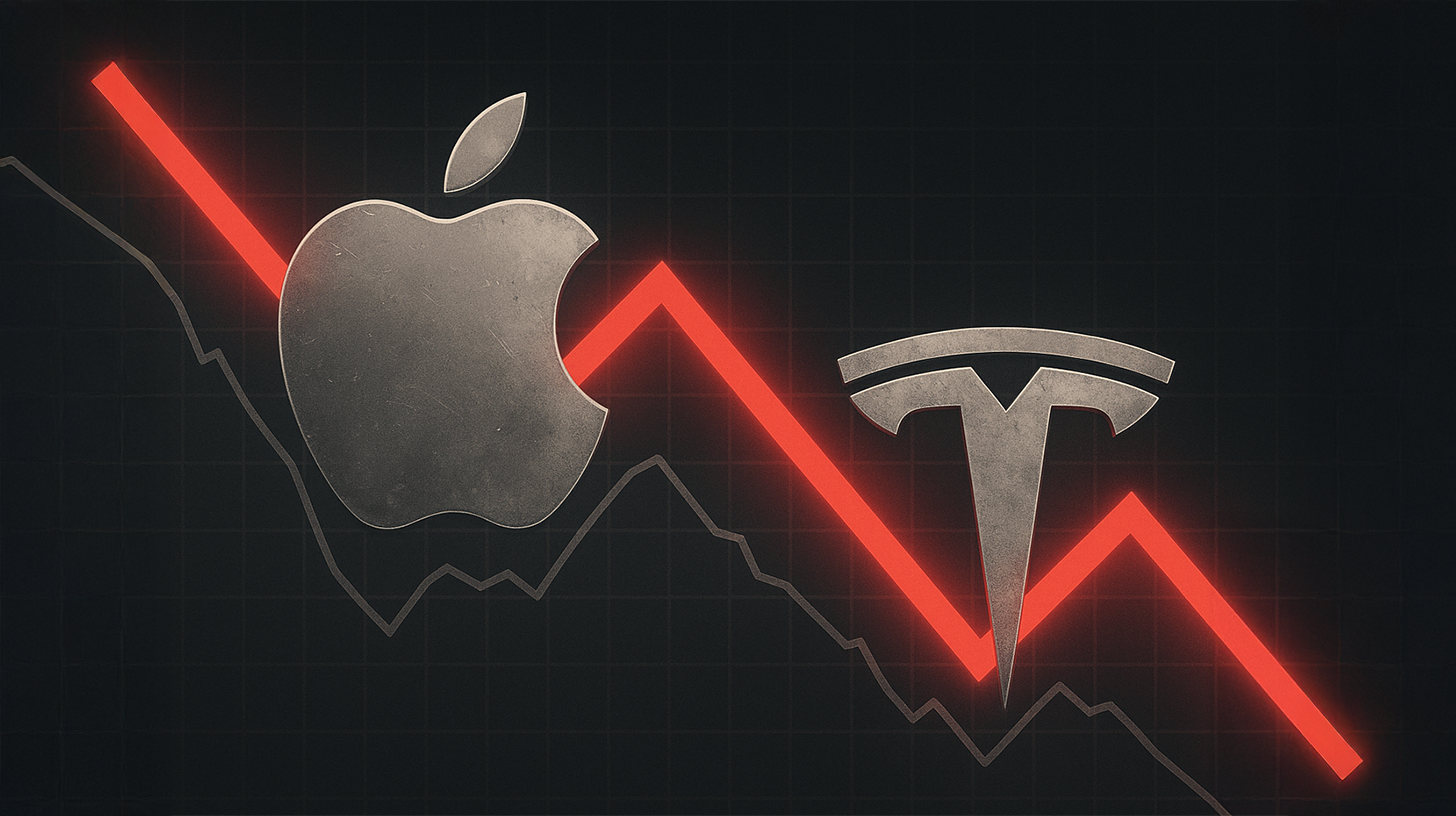
The shine is fading: The two tech giants Tesla and Apple are now falling behind in the “Magnificent Seven” – Image: Xpert.Digital
The 'Magnificent Seven' in Transition: A Comprehensive Analysis of the Tech Giants
What are the “Magnificent Seven” and why do they dominate the technology industry?
The "Magnificent Seven" refers to the seven most valuable technology companies in the United States, which together account for a significant portion of global market capitalization. This group consists of Apple, Microsoft, Alphabet (Google), Amazon, Meta (Facebook), Nvidia, and Tesla. The term was coined by Bank of America in 2023 and refers to the 1960s Western film of the same name to underscore the exceptional position of these companies.
These seven tech giants have a combined market capitalization of over $18.7 trillion and account for approximately 35 percent of the S&P 500. Their dominance is evident not only in their sheer size, but also in their influence on the overall market. When these companies deliver strong results, they pull entire indices along with them; conversely, their weaknesses can weigh on the entire market.
Suitable for:
- In truth, the Magnificent 7, according to estimates, ensure a US trade surplus of EUR 112 billion (2023) to the EU
How did the group divide itself into frontrunners, midfield and laggards?
The pioneers: Microsoft, Nvidia and Meta
Microsoft has emerged as the clear winner, becoming the second company after Nvidia to reach a market capitalization of over $4 trillion in July 2025. The company is benefiting massively from its Azure cloud business, which saw 33 percent growth. Its close partnership with OpenAI and the integration of AI into Office products have given Microsoft a leading position in the AI space.
Meta is surprising with impressive business figures and one of the most favorable price-to-earnings ratios (P/E) within the group at around 21. The company recorded revenue growth of 22 percent and is benefiting from steadily rising advertising revenues. CEO Mark Zuckerberg has formulated the vision of making "personal superintelligence accessible to everyone."
Nvidia dominates the AI chip market and is the world's most valuable company with a market capitalization of over $4.4 trillion. Revenue grew 78 percent to $39.3 billion last quarter.
The midfield: Alphabet and Amazon
Alphabet and Amazon are solidly positioned in the middle of the pack, but are being held back by internal challenges. Alphabet is battling growing competition in the search engine business from AI-powered alternatives like ChatGPT. Amazon's cloud division, AWS, is growing at 17 percent, slower than Microsoft's Azure.
The laggards: Apple and Tesla
Apple is struggling with a P/E ratio of 29 (its share price is 29 times earnings per share) and stagnating iPhone sales. The import tariffs imposed by Trump are particularly burdening the company, as it is heavily dependent on production in China. Its innovative strength is increasingly being questioned, and the company has yet to present a clear AI strategy.
Tesla is facing major challenges. The company reported a 12 percent decline in revenue and a 16 percent drop in profits. Doubts are growing about its successful transformation from an automaker to an AI hardware company.
What role does the interdependence of companies play?
The interdependence of the tech giants poses a significant risk. Microsoft's growth relies heavily on partners like Meta and OpenAI, which in turn rely on Microsoft's Azure infrastructure. These interdependencies mean that problems in one area can quickly spread to others.
This is particularly evident in the relationship between Microsoft and OpenAI. Despite an investment of over $13 billion, tensions are growing between the partners. OpenAI is trying to reduce its dependence on Microsoft and has also been using Google Cloud since January 2025.
This dependency is also evident in the hardware: Virtually all major AI developments rely on Nvidia chips. This makes Nvidia the quiet king of the AI revolution, but also creates a critical dependency for the entire industry.
Why could Microsoft, Nvidia and Meta be the winners?
Microsoft: The platform giant
Microsoft has established itself as a leading AI provider with several advantages:
- Azure recorded annual revenue of over $75 billion for the first time in 2025
- The integration of OpenAI technology into Office products creates direct monetization
- Tools like Copilot provide leaps in efficiency in companies
- The combination of infrastructure, software and distribution makes Microsoft a complete AI solution
Nvidia: The hardware monopolist
Nvidia's dominance is based on:
- Quasi-monopoly position in AI training chips
- Gross margins of over 73 percent
- Sales growth of 78 percent in the last quarter
- Technological advantage with new chip generations such as Blackwell
Meta: The Efficiency Champion
Meta impresses with:
- Operating margin of 41 percent
- Cheapest P/E ratio within the Magnificent Seven
- Strong growth in daily active users (3.43 billion)
- Successful integration of AI into existing platforms
What specific challenges do Apple and Tesla face?
Apple: Innovation backlog and customs problems
Apple faces several challenges:
- High dependence on production in China makes the company vulnerable to Trump's tariffs
- Lack of a clear AI strategy compared to competitors
- Stagnant iPhone sales and saturated markets
- P/E ratio of 29 with weak growth
Bank of America has calculated that an iPhone could be up to 90 percent more expensive if it were entirely produced in the US. The stock has fallen 22 percent since the beginning of the year—the weakest performance among the Magnificent Seven.
Tesla: Structural transformation failed?
Tesla is struggling with fundamental problems:
- Sales decline of 12 percent, profit decline of 16 percent
- Vehicle deliveries fell by 13.5 percent
- Increasing pressure from Chinese competitors
- Unclear strategy for the transition to AI hardware
- CEO Elon Musk warns of “tough quarters”
Doubts are growing as to whether the transformation from automaker to AI company can succeed. Musk's own AI startup, xAI, could also compete with Tesla's ambitions.
Suitable for:
- The US services from Google, Amazon, Meta, Apple, Microsoft, Tesla and Nvidia, which are missing in the US trade balance
How does joint development in the AI field influence the risk of interdependence (dependency structure)?
Concentration risk is amplified by AI development. The Magnificent Seven are engaged in a race for AI dominance, leading to several risk factors:
Technological dependence
All companies rely on similar technologies and infrastructure. A breakthrough like DeepSeek's more efficient AI models can disrupt the entire group.
investment bubble
The enormous investments in AI infrastructure—Microsoft alone plans to invest $64-72 billion in 2025—could lead to overcapacity. Analysts are already warning of parallels to the dot-com bubble.
Regulatory risks
Increasing scrutiny by antitrust authorities and AI regulation affects all companies simultaneously.
Market concentration
The top 10 US stocks make up over a third of the S&P 500 – the highest concentration since the 1960s.
What does John Flood of Goldman Sachs predict for the tech giants?
John Flood, Head of Americas Equities Sales Trading at Goldman Sachs, sees great potential for a return of the US tech giants in the summer of 2025. His main arguments:
- Strong quarterly figures: The Magnificent Seven exceeded expectations by an impressive 13 percent
- Improved valuations: The combination of rising profits and falling share prices has brought valuations to a more reasonable level
- Seasonality: July is traditionally considered a strong month for share buybacks, which could generate additional demand
- Economic independence: These companies are less dependent on general economic growth, which is an advantage in uncertain times
Flood is optimistic that these factors will enable the tech giants to outperform the broader market.
Which companies could complement or replace the Magnificent Seven in the future?
Broadcom: The eighth giant
Broadcom has already temporarily overtaken Tesla in market capitalization and is considered the hottest candidate for inclusion:
- Market capitalization of over $1.2 trillion
- Strong growth in the AI chip sector
- CEO predicts AI market potential of $60-90 billion by 2027
Palantir: The AI specialist
Palantir is mentioned as a candidate by several experts:
- Big data company makes AI truly usable
- Market capitalization of $370 billion
- Sales growth of 39 percent
- Solves critical data integration problems for government and businesses
Other candidates
Analysts also mention:
- AMD: Close Nvidia competitor in AI chips
- Eli Lilly: Pharmaceutical giant with strong growth
- ServiceNow: Cloud software specialist
- Netflix: Former FAANG member makes a comeback
Developments show that the Magnificent Seven are not a static construct. While Microsoft, Nvidia, and Meta are expanding their dominance, Apple and Tesla are fighting for their position. New challengers are already waiting in the wings.
Suitable for:
Your global marketing and business development partner
☑️ Our business language is English or German
☑️ NEW: Correspondence in your national language!
I would be happy to serve you and my team as a personal advisor.
You can contact me by filling out the contact form or simply call me on +49 89 89 674 804 (Munich) . My email address is: wolfenstein ∂ xpert.digital
I'm looking forward to our joint project.

